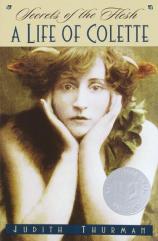Excerpt
Excerpt
Secrets of the Flesh

"Biographers generally believe that it is easy to be a 'monster.' It iseven harder than being a saint." - COLETTE, Lettres à ses pairs
In March of 1900, a forty-one-year-old Parisian man of letters published a novel that purported to be the journal of a sixteen-year-old provincial schoolgirl named Claudine. Henry Gauthier-Villars was best known as an amusingly opinionated music critic who had championed Wagner and insulted Satie. His paunch and top hat had endeared him to the cartoonists of the penny press; and his duels, his puns, and his seductions of women managed to generate almost as much copy as he wrote himself. Gauthier-Villars used his own name for scholarly nonfiction and one of many pseudonyms when a work was light. He and his alter egos-Willy, Jim Smiley, Boris Zichine, Henry Maugis, and the Usherette-had a bibliography which already included a collection of sonnets, another of essays on photography, several comic almanacs, a monograph on Mark Twain, and a number of salacious popular novels. It was not a very well kept secret that most of these works had been improved by other hands, if not entirely ghostwritten. In an ironic bow to this reputation, Willy claimed that the new manuscript had arrived in the mail tied with a pink ribbon-the literary equivalent of a baby girl delivered by the stork.
Claudine at School was not the first authorial travesty of its kind, and certainly not the last, although Claudine herself was something new. She was the century's first teenage girl: rebellious, tough talking, secretive, erotically reckless and disturbed, by turns beguiled and disgusted at her discovery of what it means to become a woman. In his preface to the book, Willy calls her "a child of nature," a "Tahitian before the advent of the missionaries," and he pays homage to her "innocent perversity" even while regretting "this word 'perversity,' which subverts the idea that I wish to give of . . . Claudine 's special case-for the very reason that I insist one cannot find any conscious vice in this young girl, who is, one might say, less immoral than she is 'amoral.' "
The novel languished for a few months until Willy rallied his influential friends, who duly produced reviews hailing Claudine at School as a masterpiece. By autumn, it had sold some forty thousand copies, becoming--including its four sequels--one of the greatest French bestsellers of all time. There were five Claudines in all, two successful plays, and a range of product spin-offs in the modern sense, including Claudine cigarettes, perfume, chocolates, cosmetics, and clothing. The "author," notorious to begin with, became something of a brand name himself. "I think that only God and maybe Alfred Dreyfus are as famous as [Willy]," said Sacha Guitry.
The man who signed Claudine at School is now best remembered as the "deplorable" first husband of the woman who wrote it. Madame Henry Gauthier-Villars, née Sidonie-Gabrielle Colette, was then an athletic beauty of twenty-seven who could pass easily for seventeen. She concealed her feelings and her talent, but she flaunted her rustic accent and a plait of auburn hair as long as she was tall. Her family in Burgundy still called her "Gabri," but in Paris she went by the waifish moniker of Colette Willy. She had rejected her own first name long before she married, insisting that her school friends--rowdy village girls like herself and like Claudine--call one another by their patronyms, comme des garçons. When she married for the second time, Colette Willy became Colette de Jouvenel, and finally, triumphantly, syncretically, just Colette.
Colette began writing in her early twenties, living turbulently and working tirelessly, her powers waxing as she aged. In the course of half a century, she produced nearly eighty volumes of fiction, memoirs, journalism, and drama of the highest quality. Her published correspondence fills seven volumes, and at least three important collections of letters remain unedited. Her critics and biographers have been more prolific than she was.
Digesting this colossal banquet was not the greatest of my challenges as her biographer. Colette 's friend Jean Cocteau liked to say: "Je suis un mensonge qui dit toujours la vérité": I am a lie that always speaks the truth. To which Colette 's American anthologist, Robert Phelps, would add: she is a truth who always speaks a lie. A French critic would note more expansively: "Colette's art is that of the lie. But the great game she plays with us is, precisely, to stuff her best lies with great flashes of truth. To read her with pleasure thus consists of disentangling, with a deft pair of tweezers, the true from the false." The autobiographical candor of Colette 's best writing is an illusion, just as her celebrated physical immodesty is misleading. She has, as Dominique Aury puts it, "a fierce modesty of sentiment." She actively disdains all forms of empathy and resists being known.
Excerpted from Secrets of the Flesh © Copyright 2012 by Judith Thurman. Reprinted with permission by Ballantine. All rights reserved.
Secrets of the Flesh
- paperback: 640 pages
- Publisher: Ballantine Books
- ISBN-10: 0345371038
- ISBN-13: 9780345371034







